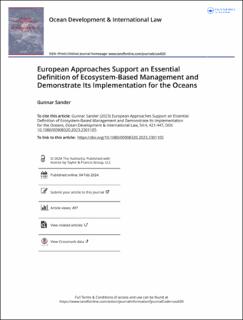| dc.contributor.author | Sander, Gunnar | |
| dc.date.accessioned | 2024-04-19T11:28:10Z | |
| dc.date.available | 2024-04-19T11:28:10Z | |
| dc.date.created | 2023-10-12T09:16:43Z | |
| dc.date.issued | 2024 | |
| dc.identifier.citation | Ocean Development and International Law. 2024, 54 (4), 421-447. | en_US |
| dc.identifier.issn | 0090-8320 | |
| dc.identifier.uri | https://hdl.handle.net/11250/3127433 | |
| dc.description.abstract | Unclear, contested definitions and high complexity have been used to explain why ecosystem-based management (EBM) has been hard to implement. This still seems to be a problem, judging from the unspecific references to it in recent international instruments and other approaches being preferred. This article argues that an essential definition of EBM that captures its indispensable roles can clarify its the key rolemeaning. Beyond that, a wide diversity can be found due to adaptations to different ecological, social and political contexts. In short, EBM entails managing human activities for sustainable use, so the cumulative impacts of uses are kept below critical thresholds for the ecosystem to be managed. The specific integrative role of EBM is integration across ecosystem components, governance arrangements, and broad strands of knowledge in support of management. This understanding should not be controversial and is supported by approaches to implementing EBM in Norway and the EU. Their approaches to EBM for the oceans share key characteristics: they operate on similar spatial scales; use strategic planning; define cyclic, adaptive processes with similar content; and apply management by objectives. With the proclaimed nature crisis, renewed attention to the definition and implementation of EBM is needed. | en_US |
| dc.description.abstract | European Approaches Support an Essential Definition of Ecosystem-Based Management and Demonstrate Its Implementation for the Oceans | en_US |
| dc.language.iso | eng | en_US |
| dc.publisher | Taylor & Francis | en_US |
| dc.rights | Navngivelse 4.0 Internasjonal | * |
| dc.rights.uri | http://creativecommons.org/licenses/by/4.0/deed.no | * |
| dc.subject | Havforvaltning | en_US |
| dc.subject | Ocean governance | en_US |
| dc.subject | EU - europeisk politikk | en_US |
| dc.subject | EU - European policy | en_US |
| dc.subject | Sammenlignende politikk | en_US |
| dc.subject | Comparative politics | en_US |
| dc.title | European Approaches Support an Essential Definition of Ecosystem-Based Management and Demonstrate Its Implementation for the Oceans | en_US |
| dc.type | Peer reviewed | en_US |
| dc.type | Journal article | en_US |
| dc.description.version | publishedVersion | en_US |
| dc.rights.holder | © 2024 The Authors | en_US |
| dc.subject.nsi | VDP::Samfunnsvitenskap: 200 | en_US |
| dc.subject.nsi | VDP::Social sciences: 200 | en_US |
| dc.subject.nsi | VDP::Samfunnsvitenskap: 200 | en_US |
| dc.subject.nsi | VDP::Social sciences: 200 | en_US |
| dc.source.pagenumber | 421-447 | en_US |
| dc.source.volume | 54 | en_US |
| dc.source.journal | Ocean Development and International Law | en_US |
| dc.source.issue | 4 | en_US |
| dc.identifier.doi | 10.1080/00908320.2023.2301105 | |
| dc.identifier.cristin | 2183989 | |
| dc.relation.project | EU – Horisont Europa (EC/HEU): CrossGov, No. 101060958 | en_US |
| dc.relation.project | Framsenteret: Sustainable Development of the Arctic Ocean (SUDARCO), Cristin-ID 2551323 | en_US |
| cristin.ispublished | true | |
| cristin.fulltext | original | |
| cristin.qualitycode | 2 | |

